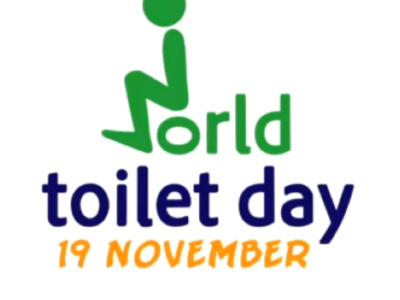Happy World Toilet Day!
For Billions of People, Sanitary Facilities Are No Laughing Matter
 It may seem silly to observe World Toilet Day, but as the motto of the World Toilet Organization (which was founded on November 19, 2001) reads: it’s no joke. Literally billions of people lack proper toilet facilities, and it can have severe impacts. Consider this recent testimony from a woman who grew up without one:
It may seem silly to observe World Toilet Day, but as the motto of the World Toilet Organization (which was founded on November 19, 2001) reads: it’s no joke. Literally billions of people lack proper toilet facilities, and it can have severe impacts. Consider this recent testimony from a woman who grew up without one:
To get there, I had to walk 10 minutes, stand in the queue for my turn and be vigilant about my safety. At crowded times, like in the morning and evening, I might have to wait 10 minutes. The people in line would be dancing to keep from peeing and complaining about how the people using the toilets were taking too long.
It was also filthy. The toilets were never cleaned. One had to master special maneuvers to avoid messing oneself with human waste found inside. Since there was no toilet paper, people would wipe their hands on the walls.
[F]or a girl, visiting the toilet at night can be very risky. Walking in the dark gives men opportunities to prey on young girls — to molest or rape them. My friends and I were terrified of this possibility and never ventured out between dusk and dawn….
During menstruation, many girls would skip school to stay at home. If they soiled their clothes in front of their peers, there was no place to go and change. My friends and I would often miss two to three days each month just to avoid potential shame. Although this affected attendance and performance among girls, I don’t remember this issue being addressed by the school. It was seen as normal, and no effort was made to help the girls catch up with the lessons they had missed. This was the time that many girls dropped out. I stayed in school, but it was not easy.
Okay, but for those of us in the developed world, toilets aren’t really an issue, right? Wrong. Sanitation facilities implicate core traditional environmental concerns. Here in California, in the midst of the drought, it is quite remarkable that water for toilets all too often comes from the general, potable supply. I don’t know whether anyone has tried to estimate the problem, but we could be talking about tens of thousands of acre-feet of potable water that could be saved if, say, shower water could be diverted to toilets.
Dealing with toilets might not be as inspirational as, say, saving the Yosemite Valley, but it is probably more important. We should recognize it. Here is another good piece about the issue: not too long, and perhaps readable when, well, you are next on the toilet.







Reader Comments